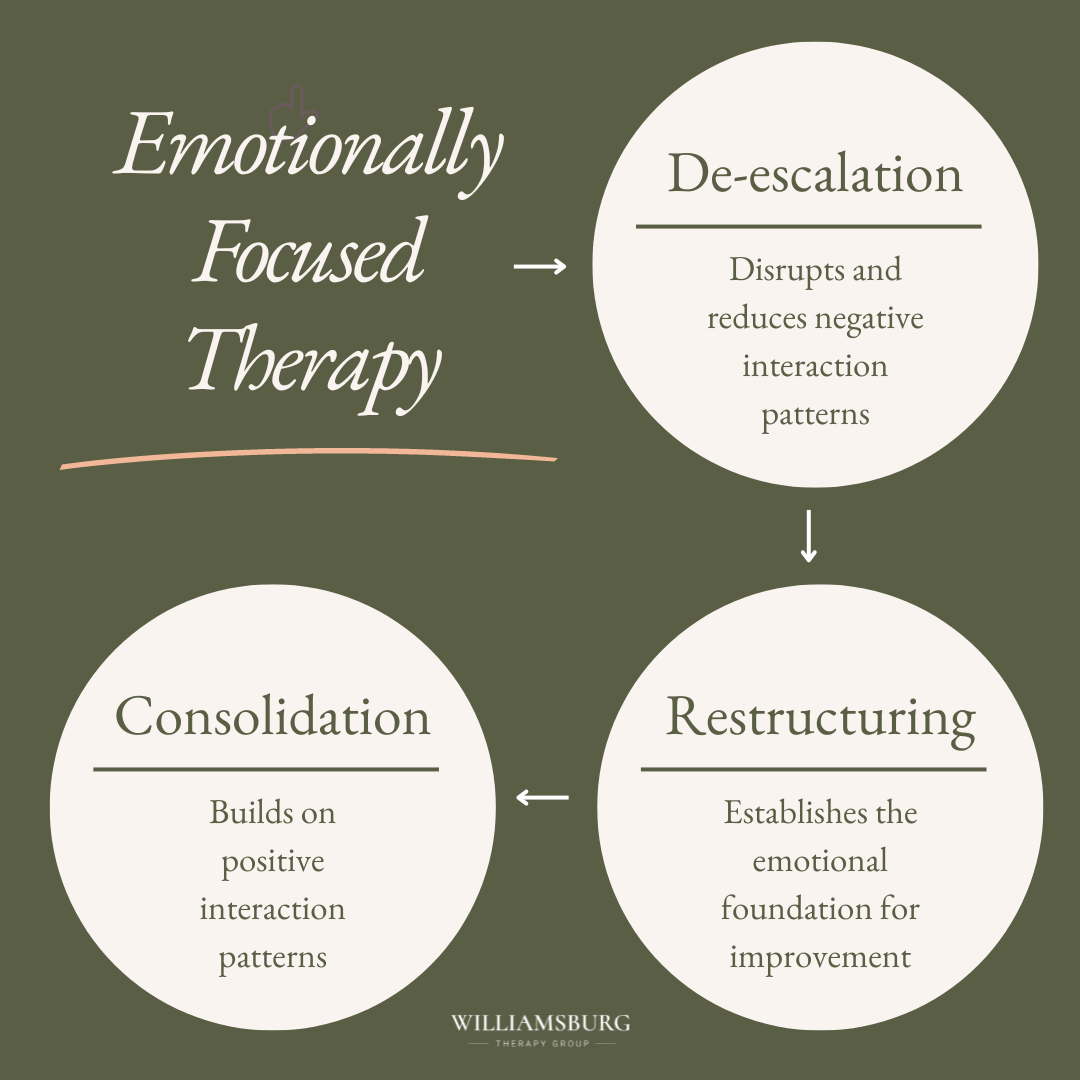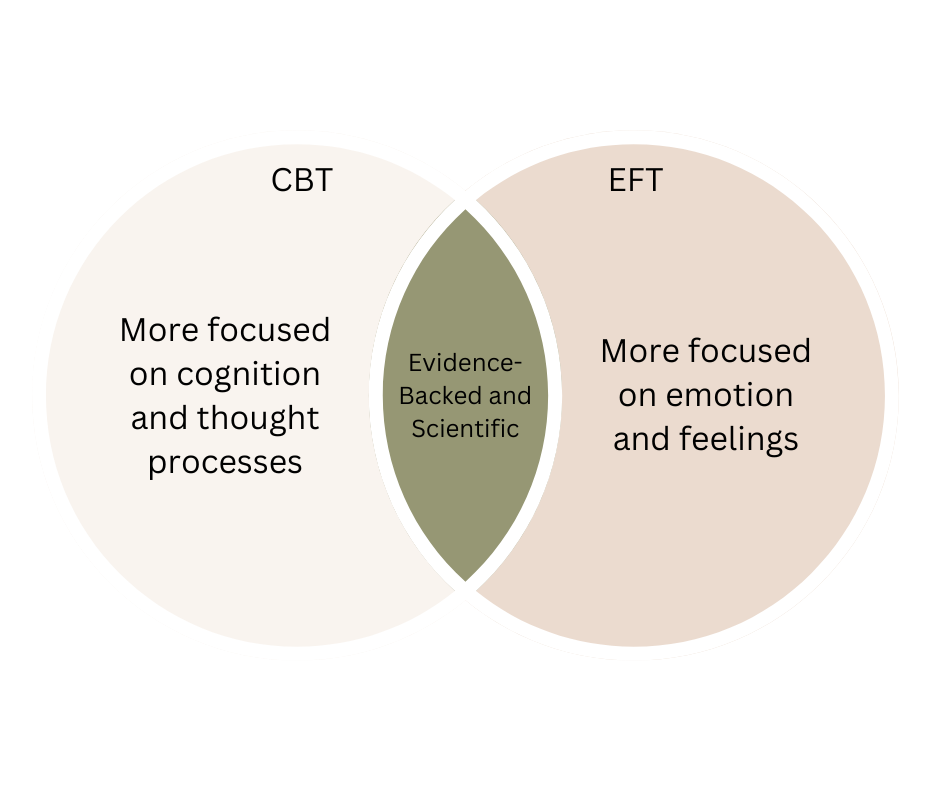How to Express Romantic Love: Effective and Heartfelt Gestures
All the world celebrates romantic love, and people from all walks of life look for ordinary moments and extraordinary ones to express love to their...
4 min read
![]() Williamsburg Therapy Group
:
Feb 16, 2023 2:04:14 PM
Williamsburg Therapy Group
:
Feb 16, 2023 2:04:14 PM

It happens to so many couples: The conversation dries up, you feel stuck, and there seems to be something getting in the way of your communication. Or maybe the opposite has happened, and you can't talk about anything without starting an argument.
Every relationship experiences tension, but for many, it's a chronic condition. If you feel that you and your partner are stuck in a rut or conflicting over things that haven't been a problem in the past, emotionally focused therapy may be able to help you get to the root of the problem and communicate more effectively.
But what exactly is emotionally focused couples therapy? What makes it so effective for so many couples? Is it worth trying for your relationship?
In this article, we're going to do a deep dive on the emotion-focused therapy process, its results in a typical case, and what it may be able to do for your relationship.
Emotionally Focused Couples Therapy Resources on This Page:
Emotionally Focused Therapy: The Process, The Results, and The Details
What does emotionally focused therapy do for couples?
What makes emotionally focused therapy different from other therapy forms?
What else can I expect to do in emotionally focused therapy?
Emotionally-Focused Therapy in Austin: Williamsburg Therapy Group
Emotionally focused therapy is a short-term talk therapy that uses the theory of attachment to guide the steps and methods of therapy.
Typically consisting of 8 to 20 sessions, emotionally focused couples therapy analyzes emotional responses to help develop a closer bond in a given relationship.
Attachment theory posits that the ubiquitous human need for close relationships and, by extension, the factors behind relationship distress are not learned behaviors but rather are hardwired into our brains at a very primal level.
Based on this idea, emotionally focused therapy uses three stages of work to help people get along better with each other. The three stages of emotionally focused couples therapy are:
The de-escalation stage of EFT is dedicated to reducing and eliminating unhealthy communication and interaction patterns in a relationship.
Most people utilize unhealthy communication methods in order to protect themselves from slights or pain. Some of these methods include:
Unhealthy communication techniques and the fallout that results from them are also called negative interaction cycles. While they can protect the user from some emotional pain in the short term (for example, giving the silent treatment means the conversation is effectively over for the time being), they can be extremely damaging in the medium and long term, both to the relationship and to your and your partner's mental health.
De-escalation points these behaviors out and advises on how they are contributing to the relationship's current problems.
Restructuring in EFT is about developing the emotional foundation needed to make communicative and behavioral changes.
Negative patterns in communication often arise from deeper, more profound emotional responses and habits. Restructuring those habits to be healthier paves the way for the communication in the relationship to become stronger and more productive.
This includes helping both partners be more emotionally available as well as more willing to have the hard conversations.
While de-escalation focuses on removing the negative from the relationship, the restructuring portion of EFT focuses on building on the positive.
During this stage of EFT, the couple will work on building up their communication skills so that the partnership can become stronger and more intimate over time.
Healthy communication starts with the emotional availability practiced in the restructuring stage. In contrast to unhealthy communication, healthy communication can look like:
Upon completion of these three stages, which usually take approximately 8 to 20 sessions, most couples will find that they have stronger communication, more intimacy, and an overall better relationship.
EFT therapists want to improve the emotional experience and emotional awareness of the couples that attend their sessions.
Attachment theory states that emotions and emotional distress are not just reactions that human beings have to external stimuli. Rather, our emotional regulation is a guiding force in our lives in the most practical sense.
Therefore, especially in the context of relationships and family, maintaining a healthy emotional landscape is imperative to overall mental health and behavioral stasis. Negative interactions lead to negative emotions, and vice versa. EFT accepts this and tries to fix it from both directions.
While most forms of therapy take emotions into account, EFT is unique in that it's centered on emotions.
Cognitive therapies like CBT are similar to EFT but tend to focus more on cognition—that is, your thoughts—and how they relate to behaviors. Emotionally-focused therapy, by contrast, focuses on how emotions relate to behavior.
Both EFT and cognitive therapies are generally effective for most attendees, and both have been studied with academic rigor and put through the peer review process. Just like prescription medication and nutrition, researchers study these therapeutic techniques objectively in order to make advancements and ensure maximum patient success.

Your experience with emotionally focused therapy will depend on your exact case as well as the severity of the dysfunction in your relationship.
Courses may consist of only eight sessions of relatively light practice in more effective communication techniques. Or, if necessary, you may have 20 or more sessions of intensive exploration into why you and your partner feel and behave in certain ways.
The most important thing you can do to prepare for emotionally focused couples therapy is commit to trusting your therapist.
Sometimes, therapy can be a difficult or uncomfortable process. In fact, one of the reasons some couples have communication failures in the first place is because they choose comfort over the work it takes to heal. Therapy may cut through that, and sessions can lead to discussions you never thought you would have with your partner.
Trust that your therapist is using science- and rationally-based techniques to make progress. They have years of education and training in the field and have the experience and knowledge needed to get it done. If you don't trust them, progress will be inhibited.
If you feel like you and your partner would benefit from EFT couples therapy, we would like to invite you to give us a call. Our patient coordinator will match you with your ideal therapist and simplify the process of signing up, so you can focus on the healing process.

All the world celebrates romantic love, and people from all walks of life look for ordinary moments and extraordinary ones to express love to their...

What is relationship burnout or relationship fatigue? Many of us have heard of burnout, but we often connect it to professional life and the problems...

In today's digital age, so many of us are locked into our mobile devices each and every day, which can have a negative impact on our mental...